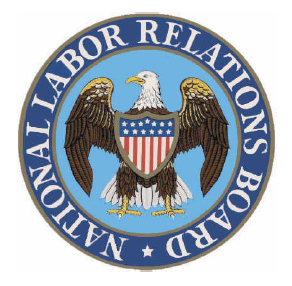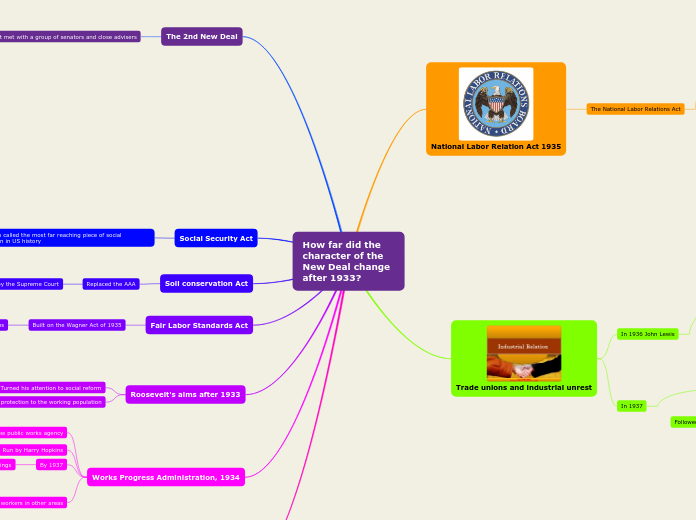How far did the character of the New Deal change after 1933?

National Labor Relation Act 1935
The National Labor Relations Act
replaced Nira
It was a charter for the workers
This act gave workers the right to form and join trade unions
Employers could not penalise those workers who did so
The National Labor Relations Board was set up to protect the rights of workers

Trade unions and industrial unrest
In 1936 John Lewis
brought together many separate unions into one big organisation
Called the Congress of Industrial Organisation (CIO)
Some big companies
refused to let their workers join a union
In 1937
Sit-down strikes in the car and steel industries
Followed by all-out strikes
Involving violent clashes between strikers and police
The 2nd New Deal
Roosevelt met with a group of senators and close advisers
They persuated him to
Take radical steps to achive his vision
Make the USA a fairer place for all Americans
He presented with a huge range of laws that he wanted passed
Wagner Act
Forced employers to allow trade unions in their companies
Let them negotiate pay and conditions
It made illegal to sack workers for being in prison
Social Security Act
Provided State pensions for the elderly and widows
Provide help fot the sick and the disable
If workers become unenployed, they would recive a small amount to help them out until they could find work
Work Progress Administration (WPA)
Brought together all the organizations whoose aim was to create jobs
It also extended this work beyond buildings projects to create jobs for office workers and even unenployed actors, artist and photographers
The government paid artists to paint pictures to be displayed in the city or town they featured
The Resettle Administration (RA)
Helped smallholders and tenant farmers who had not been helped
The Farm Security Administration (FSA)
Replaced de RA in 1937
It gave special loans to small farmers to help them buy their land
It also built camps to provide decent living conditions and work for migrant workers
Social Security Act
Has been called the most far reaching piece of social legislation in US history
It was really severallaws inc and provided for:
Pensions for the old and widows of up to $85 a month
Help for the disbiled and children in need
A national system of insurance for the unemployed
Soil conservation Act
Replaced the AAA
Which had been rule ilegal by the Supreme Court
It made grants to farmers who improved and conserved the soil on their lands
Fair Labor Standards Act
Built on the Wagner Act of 1935
It established maximum hours of work and minimum wages
It also controlled the use of child labour
Roosevelt's aims after 1933
Turned his attention to social reform
Provide security for those affected by the Depression
To give more protection to the working population
Replace the agencies ruled illegal
By the Supreme Court
Works Progress Administration, 1934
A big new public works agency
Set up to put people to work on projects valuable to the community
Run by Harry Hopkins
Workof the CWA and the PWA
By 1937
had been copleted 1100 schools and public buildings
69000 kilometres of roads
Employment was also given to workers in other areas
Umemployed writers
To produce guide book to states and cities
Artists
Painted murals
Actors
sent out on nationwide tours
The WPA gave work to 2 million people a year
Securities and Exchange Commission, 1934
Set up to prevent another "Wall Street Crash"
Regulated the conduct of the stock
People now had to make a minimum down payment of 50-60 percent
Before buying shares
